#fiction meta
Text
Sometimes we audience act like unreliable narrators are a way which authors play "gotcha!" with the audience, and sometimes they are. Sometimes it's like "gotcha! It's all in his head! His perception can't be trusted cause he's crazy!"
But more often they're just ways for authors to invite you into the narrator's world. Whether the narrator is delusional (medically or colloquially) or a liar, they're trying to say "this is my story". Stories are words we tell ourselves to make sense of this world and sometimes we just want our subjective experience to be believed.
It doesn't matter which version is the "real" story in Life of Pi because the story ask you to engage with the one that was being told. And you gotta be willing to engage with the one told to you honestly, otherwise you've wasted your time and there is no story.
20 notes
·
View notes
Text
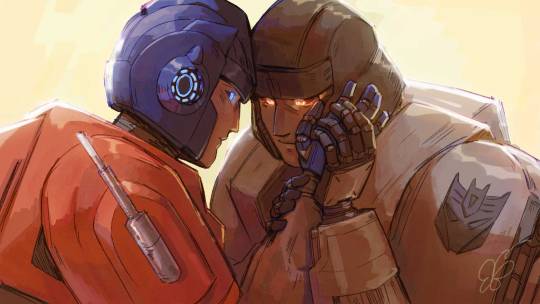
i love normal guys doomed by the narrative
#either that or hilariously dysfunctional or both#tf one#orion pax#d 16#megop#megatron#optimus prime#my art#saw one post pointing out in the trailer that a like5 frame shot of megatrons cannon that was snuck between their mahoushoujo type transfor#mations and like.messed up deeply messed up u see how goofy best friends orion and megsy are theyre just silly guys but in every telling of#their story they always end up enemies ok like in a meta multiverse hopping way think about it.like oh my god prewar tfp megop was already j#juicy and earthspark divorced-remarried megop is like.RGHFH tf one is going to destroy me bc this is what they had Before do u get me#before the war before they fell apart before friends became enemies and hands were stained before the beginning of the end im so so normal#like ok.this silly tight goofy buddy dynamic thats shown in tf one so far is.is what they had before. its what they could have kept if only#if only things turned out differently. but in every world optimus prime and megatron end up leading opposite sides of the bloodiest war ever#ok.its a universal fact and everyone who knows any transformers knows this BUT THE CHARACTERS DONT THEYRE POWERLESS TO PREVENT IT#ill clean up these tags in the morning but like im so.so normal about fictional robot guys#anyway i was intending to draw a background for this but i got lazy and also spent too long on the hands!!!!so whatever
3K notes
·
View notes
Text
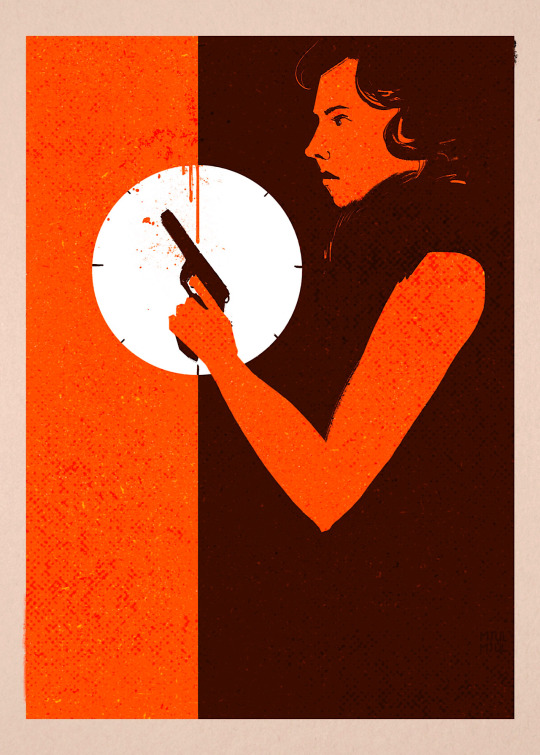
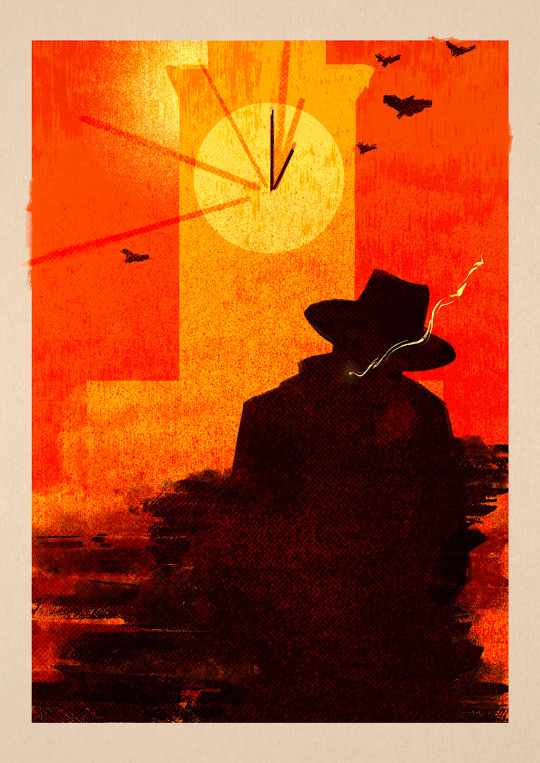
Katya / Goncharov
#yeah ik ive posted them before sorry but i REALLY like how these look together#martin scorsese#goncharov#artists on tumblr#illustration#unreality#<— posters for a ‘movie’ that doesn’t actually exist but is a tumblr meme in which everyone pretends it does&makes content for it#fascinating how we’re immediately personable w katya by knowing her first name while only knowing goncharov’s surname keeps us at a distanc#combined with him being the only major character to go by a moniker it emphasizes just how much he's been consumed by the role he plays#who is goncharov? does he know and keep it secret? or has he too lost his sense of identity?#it's reflected in these posters as we SEE katya but goncharov remains elusive - yet clearly time is running out for them both#lakjdklf ok im done now i never post meta on here so im having fun with the fictional movie#btw I updated both of the illustrations compared to the original posts but will leave those as they were#woudl be cool if my post showed up. u can do it tumblr
21K notes
·
View notes
Text
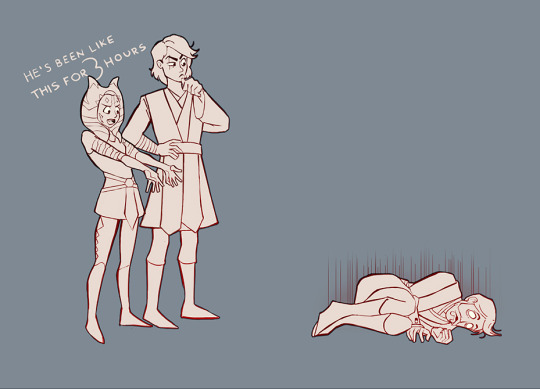
when the horrors catch up and you take an evening off to batch-process
#obi-wan kenobi#anakin skywalker#ahsoka tano#maybe obi-wan just read the outline for the next wip#why do i love to torture him so#one of my fav fanfic genres has to be meta fic horror#just imagine. how deeply disturbing it must be to find out you're a fictional character#somebody has *intentionally* written all those horrors onto you#and it wasn't even the guy who created you#he did his part. but the ppl who love it most to ruin your life and see you suffer are your fans#it's not enough that there's prob a lot of jedi rpf around in the gffa already. scarred obi-wan for life#lmao drawing anakin like this gave me so many flashbacks to my old ocs where almost every male character had that hair#also i have a job interview in one hour dsdsfhjgj#my art#prahacat draws
2K notes
·
View notes
Text
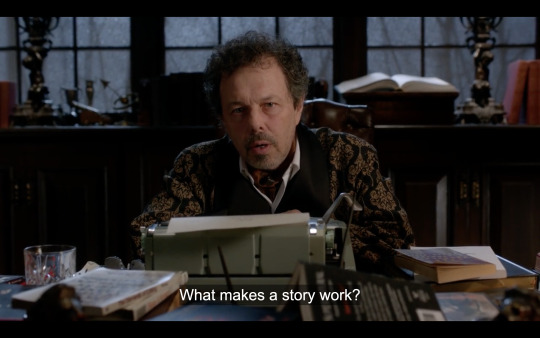
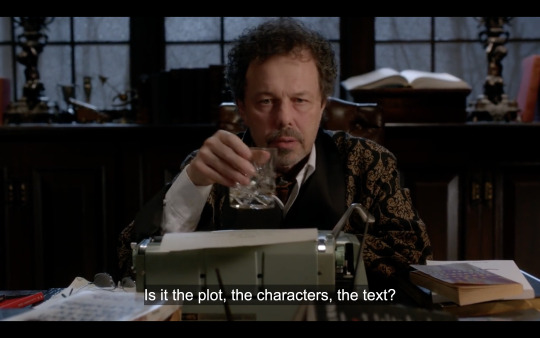

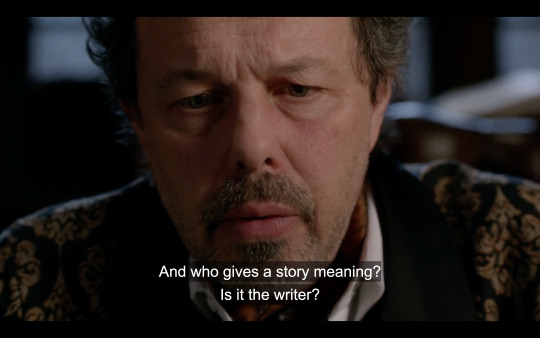
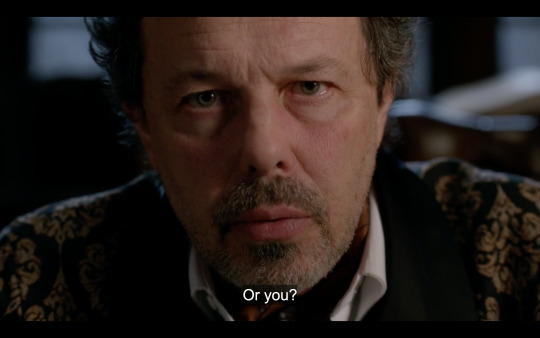
truly a moment in tv history. like they are directly addressing the audience with these questions while the spn tptb are in real life bullying the show's fans over these exact questions
#sorry i actually enjoy all the meta episodes#thank you robbie thompson i guess#and honestly i've never known another piece of media to be so adamt to be interpreted in the exact same way that they want it to be#interpreted. while the actual creators don't even have a shared consensus what the story should be about and how it should be seen#s9 rewatch#9x18 meta fiction
2K notes
·
View notes
Text
"Do you have a plan?"
"I have concepts of a plan!"
Me, halfway through writing a 100k word long fanfiction.
#presidential debate#2024 presidential election#president trump#us presidents#donald trump#trump#kamala 2024#debate 2024#2024 debate#2024 presidential race#fan fiction#fandom things#fandom#fandom meta#fanfic#ao3 fanfic#fanfiction#ao3#archive of our own#ao3fic#fic writing#writing#writer
550 notes
·
View notes
Text


How are you Dean?
#the way they’re so soft for eachother#spn#supernatural#dean winchester#destiel#castiel#deancas#misha collins#jensen ackles#spn crack#9x18#spn 9x18#meta fiction
631 notes
·
View notes
Text
What I love about Spy x Family's recent chapters concerning Martha and Henry—two secondary characters with little direct connection to the plot as we've known it—is that Endo's taking the opportunity to once again hammer home what the story's actual stakes are. The idea of potential conflict between Ostania and Westalis isn't just window dressing for a wacky wholesome badass family gimmick—the previous wars are real events that various characters lived through, and all of them are in some way affected by it and have good reasons to want to avoid another one. This is primarily an action-adventure/slice-of-life manga with a lot of sendups to spy movies and pop culture of the 60s, but I think those things hold much more weight with the thematic underpinning of the horrors of war and the ruin it leaves behind.
#spy x family#sxf meta#obviously we have twilight's origin story/yor and yuri's parents/the experiments on anya and bond#but there's also sylvia's loss of her family and franky's history and martha's trauma and millie's resentment of fathers who came back#it fucked up the desmonds too just in different ways—donovan being Like That is why melinda demetrius and damian have suffered#and the decisions made by people like donovan from behind a desk are catastrophic for people like twilight and franky in the trenches#endo consistently engages with the implications of his setting in really interesting ways#and using a fictionalized post-war central europe is a VERY resonant choice given the history behind the current geopolitical climate
826 notes
·
View notes
Text
I'm sure this has been done countless times, but polls are fun and I'm curious, so...
For the purposes of this poll, I'm only counting shows/books/games/etc. where Sherlock is a main or very prominent secondary character, there's a decent amount of other Sherlock canon characters represented (at least a version of a John Watson), and there are some references made to the ACD originals. Not counting where he's only a relative of the lead but not a main (like Enola Holmes, RKDD, etc.)
Not counting the ACD original canon as an adaptation here, as none of these would exist without it. Everything else listed is adapting it in some way.
There's also some series I haven't watched/read yet but have been recommended that aren't on here yet for the purposes of space, including Detective L, Miss Sherlock and the Bonnie MacBird Sherlock books.
Feel free to reblog this for a larger sample size :)
#sherlock holmes#acd canon#acd holmes#yuukoku no moriarty#moriarty the patriot#cbs elementary#bbc sherlock#yuumori#house md#tgaa#the great ace attorney#herlock sholmes#granada sherlock#granada holmes#rdj sherlock#basil rathbone#detective fiction#sherlock holmes meta#my polls#jeremy brett#rdj holmes#sherlock and co#miss sherlock#sherlock holmes in the 22nd century#acd sherlock holmes#sherlock hound#the great mouse detective#polls#detective polls
600 notes
·
View notes
Text
Alright, it’s less than a week since the Owl House finale aired and as expected I’ve already seen two direct comparisons to Steven Universe’s ending and several more vague-blogs, because one of this site’s hobbies is using other queer shows to put down Steven Universe. So let’s do this, then. Let’s compare the endings of Owl House and Steven Universe, and what each is ultimately trying to say.
Steven Universe and the Owl House are both shows that deal heavily with the clash of individualism and self-expression vs. socially-mandated conformity, and both shows’ final villains ultimately embody this conflict. One major difference, however, is that Owl House approaches this from the perspective of legal/societal structures, while Steven Universe approaches it from the perspective of family structures.
Steven Universe has always been about family--and particularly the ways traumas and biases are passed down through a family--and it has always heavily used the language of metaphor to discuss these topics. The Diamonds are the ultimate extension of this theme, something a lot of bad-faith (or just bad) takes on the ending miss; they interpret the diamonds in their literal capacity as dictators, rather than the way Steven Universe always portrays them, which is as matriarchs, i.e. the heads of a family who dictate and control all the family’s other members. This metaphor becomes more and more blatant until it outright becomes text, with the Diamonds turning out to be Steven’s literal family members, with whom his part of the family is estranged because of their previous controlling behavior.
In accordance with this theme, we ultimately find out that the Diamonds’ toxic ideology, with its rigid standards of perfection, are not only something they enforce on the gems below them, but also on themselves. They are suffering from the system in their own ways, unable to live up to the standards they themselves created. And who among us hasn’t known someone like that? A parent or grandparent who grew up under a cruel, oppressive worldview, and instead of rebelling against it internalized it--who turned around and said “I dealt with this, and so can you”? And so the ending of Steven Universe is the Diamonds realizing exactly how toxic the rigid ideology they’ve spent their lives perpetuating really is, and confronting the fact that their adherence to this ideology is what destroyed their relationship with Pink, and that the only way they’re going to have a relationship with Steven is if they’re willing to commit to changing both themselves, and the family structure they’ve enforced for so long.
Emperor Belos, in contrast, is not suffering from the structures he created, because his rules were never meant to apply to him. He sees the witches (and demons, and so-on) as lesser beings, evil beings, who exist to be controlled, and ultimately, exterminated. And every element of the society he built--the schools, the government, the police force, the religion--he intentionally constructed to keep these lesser beings under his control. The real-world allegory isn’t hard to see, here. And because what Belos represents in the story is, in fact, a fascist leader, the story shows that he can’t be reasoned with in any way that matters, and instead he is ultimately ground into paste beneath the boots of the people he sought to destroy. Different themes, different endings.
Now the usual argument that comes up here is as follows: but the Steven Universe ending isn’t as realistic! Not everyone is going to change, not everyone is going to be able to be reasoned with. Not every older, conservative family member is eventually going to accept you for who you are. And while that is true, ultimately SU isn’t meant to be realistic; it’s meant to be a power fantasy. Rebecca Sugar has come out and said before that they wrote a world in which there was good in everyone, because that’s the way she wishes the world could be. That’s the world they want to be able to believe in. And I am never going to begrudge a person, much less a queer person, for finding healing in writing that kind of world.
But you know what else is unrealistic? What else is ultimately just a fantasy? Grinding your government’s fascist leader into paste under your boot, then taking over and remaking society into something that accepts everyone. Sadly, Trump is not likely to get his ass beat any time soon. And more generally, punching fascists, while ideologically sound, is something most people are not going to get to do, due to real-world consequences such as “getting beat up by the fascist’s angry friends” and “being arrested for assault”. And even if you did depose one leader, our very society is set up in a way that perpetuates all manner of injustices, and systemic change is a complex and lengthy process that almost certainly won’t be completed in our lifetimes. But it’s fun to imagine we could, isn’t it?
Both endings are power fantasies. Both show the way they want the world to be, rather than the way it is. They are very different power fantasies, which fill very different--and at times conflicting--needs. And in situations like that, internet culture really likes to pick one to be the right fantasy, the right way to look at the world.
But the truth is, both fantasies are needed! Some people need stories about your queerphobic relatives finally realizing the error of their ways and taking the necessary steps to accept and reconcile with you. And some people need stories where you get to grind fascist bastards beneath the heel of your boot. It’s okay if you prefer one type of fantasy over the other! But in the end, both are valuable, and both are important.
And isn’t it wonderful, for us to have such a diversity of great queer stories? That we can explore both of these deep, conflicting needs? Let’s appreciate each of these fantastic works for what it was meant to be, rather than trying to pit them against each other or make them conform to a single, “best” way to tell a story.
#owl house#the owl house#toh#toh finale#toh spoilers#steven universe#sunset#su spoilers#meta#discourse#my meta#queer fiction
3K notes
·
View notes
Text
analyzing the lyrics for “long face” feat. lestat de lioncourt and realizing it’s a louis diss track (with love) is making me more unhinged by the second.
so we open with the gorgeous oooh oooh wah ahhh hypnotizing portion of this song that will stay in your head and where samuel thyne reid is also showing off his *cough* vocal talent.
next….
“why the long face? my pretty baby” — cause you know louis is a sad girlie but also so fucking beautiful and irresistible to lestat when they met he couldn’t possibly understand what louis would be sad about but also… he’s ready to comfort him ALWAYS.
“i got long fangs come appraise me” —lestat is talking about how he’s a vampire so come asess my value and also … fangs could be a metaphor for his pink pony so!
“bring your long stakes that doesn’t phase me” — lestat is saying you can talk shit about me louis and drive a stake through my heart but i still love you teehe.
“i’m an actor in my make up” — he’s saying i can play games too, louis.
“i’ll get fatter when we break up” —so he’s acknowledging the confidence issues he had over the 77 year break up and the break ups before which…. i don’t have the words to speak on otherwise i’ll die.
“why does it matter who i take up?” —he’s saying why does it matter who i sleep with in regardless to antoinette and it’s like love you king… but you’re crazy.
NEXT!
“another face, another year, another place, another tear, pick up the pace, rack up the fears, now we’re having fun.” — this is a little love letter to his cult (us) telling us to get amplified bitch it’s only the beginning
the instrumental break/oohing and ahhing just so immaculate tough cookie alex & larry really did that!
“i’m piano and you’re forte.” — so this lyric right here is what drove me feral because it has so many possible meanings and a few naughty innuendos. what im going to land on however is the fact that lestat is saying im piano because he can be used in whatever way louis wants to use him and he’s saying louis you’re forte (which means my strength) so he’s like idc what you say about me because you hold me together 🥹
“you’re allegro, i’m andante.” —THIS RIGHT HERE HAD ME ON MY KNEES. this is exposing their sex life in the best way because lestat is saying oh i’m your black tar heroin? ok noted and lemme match that because you’re allegro (which means energetic, fast, super active, loud) so basically he says i know you’re addicted to me because i was there. you’re wild in bed and you’re a screamer. he then says he’s andante (slow) because he likes to take his time and worship louis and really make love to him. BYE.
“we’re boléro, prostitué.” —and then he’s like just because i said we go slow sometimes first and foremost we’re freaks. we’re nasty and we’re unspeakable and well… thank you so much for those visuals queen de lioncourt.
“another taste, another year, another place, another tear, another chase, another sneer, without a trace, you disappear, pick up the pace, pack up the gear, gimme some face, a souvenir, here come the gays, here comes the fear, now we’re having fun.” — these bars are what’s going to give miss lioncourt her first grammy nominations because she is summarizing her relationship with louis and hopes for the future.
he’s also telling louis he’s giving him exactly what he wants. he’s chasing him. he knows louis is gonna sneer at him and be annoyed but come anyway. he’s saying you ghosted me after our reunion but im going on tour and you WILL be my rockstar girlfriend. you’ll kiss me (or the pink pony) before my shows as good luck. he’s saying we’re gonna be gay and proud, we’ll take over the world, cause the vampire apocalypse, scare bitches, and have fun. we own the night.
and finally for the song to end with lestat losing himself and moaning into the mic (coming, smirks) as he thinks about his chaotic plan to get louis back well… it’s just music to my ears. and i will listen to it again. and again. and again. and again.
⭐️⭐️⭐️⭐️⭐️⭐️⭐️⭐️⭐️⭐️ rating for you lestat
signed,
your loving groupie.
#lou lou it’s so bad for you#can’t believe i just wrote meta over a fictional song PLEASE#time well spent#lestat de lioncourt#sam reid#louis de pointe du lac#jacob anderson#the vampire lestat#loustat#interview with the vampire#txt post
297 notes
·
View notes
Text
personally i do think julian bashir is trans, but not in a way that sublimates his genetic alterations into a trans allegory. i think he's disabled and trans at the same time, but i think his rebellion against his parents--the symbolic death of his old self with the name change--that's not about gender, for him, at all.
it's about the incredible violation of autonomy he experienced as a disabled person under the knife of a eugenicist society. it's about the need to reclaim some, any, of the agency that was so completely stolen from him by his parents.
it's about discovering that his entire self was deconstructed and reconstructed, without his knowledge or consent, for the express purpose of being less of a burden on his parents.
because let's not forget that the death of julian's old self was not his decision. it was his parents who killed the old self and created a new one.
let's not forget that human society in star trek is still recovering from the eugenics wars--that just because it's post-scarcity doesn't mean it's a utopia.
let's not forget the multiple episodes where bashir is forced to confront the fact that his "success story" is truthfully a gross reminder of how deeply his society (and his family) hates disabled people, not only shown in how they tried to fix him, but also in the fact that the process so rarely works as intended, yet is still done anyway--and the failures and the ones too far gone to save are locked away! with no connection to general society, and only the bare minimum provision for their physical needs, with no privacy and no autonomy!
and let's not forget that julian sees these people and is torn between the empathy he has for them, and his urge to fix them. and he goes through with this urge on Sarina, "fixing" her to conform to his idea of what she ought to be, treating her as a problem to be solved, objectifying her via "my ideal woman was trapped in this disabled body/mind and i saved her," thus continuing the cycle of violence, because even he can't conceive of a world where the disabled do not need to be fixed. where the violence done to him was wrong. fuck man
#ds9#star trek ds9#star trek#julian bashir#trans julian bashir#disabled julian bashir#disability in fiction#eugenics in fiction#cw eugenics#autistic julian bashir#doctor bashir i presume#star trek meta#jimothy watches ds9
350 notes
·
View notes
Text
Something I think about a lot and wonder if maybe gets overlooked in Twilight’s story and as vitally indicative of his character is actually in the very first chapter:
Anya isn’t needed for Strix. Twilight decides to adopt her anyway.


[Spoiler warning: Mostly this post deals with early chapters already in the anime but there is reference to chapter 62, which has not yet been animated and will be in season 3]
Twilight decides it — “I’m going to rework the mission so it doesn’t involve a child because that’s too dangerous” and he’s 100% right! Donovan Desmond is canonically a far right warmonger with fascistic authoritarian aims. His government made liberal use of the SSS — a group to mirror the Stasi — who continue to operate in morally dubious ways (much more likely they’re actively morally reprehensible, though we’ve mostly only had rumours of that so far). From what we can tell, Desmond is at best an absent father and likely actually worse than that: if that's how he treats his own children, imagine how he might treat others. And the timeline seems to indicate that the experimentation performed on Anya was done under Desmond's government — even if Twilight isn't aware of experimentation on children, he is aware of both human and animal experimentation under Desmond's government. Taking all that and also the complexity of Strix's aims, undoubtedly there were other things that could be done, more straightforward if not necessarily easier.
So. Why? Why entertain the change at all? And then, having entertained it, why go back when the reasoning is indisputable?
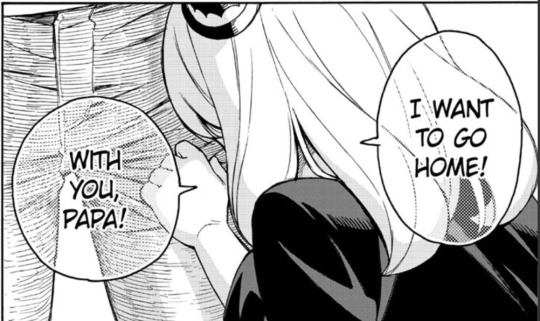
On the Doylist level, I think Endo wanted to ensure that Anya had some agency within the set up — Endo also does this with Yor. It would be much harder to be on Twilight’s side fully, or to trust him on an ethical level/take him as any sort of moral authority, if he were just straightforwardly using these two people. To have them be active and consenting participants (arguably to actually be affirming the arrangement: Twilight sets it up, but Anya and Yor actually make it happen) even if the audience only knows the depth of their knowledge/motivations/etc currently, shifts the power dynamic in important ways.
But it also the set up tells us important things about Twilight. He is largely impatient, cold, detached in chapter one. His overarching feelings towards Anya are, I think, real annoyance, real confusion, and real impatience. He just doesn’t understand this damn kid and it turns out she’s a person which is frankly unacceptable — he’d needed and anticipated an automaton, ideally of himself in miniature form. (Though I think one could ponder whether Twilight was, in many ways, an automaton himself at this point, but that's maybe for another meta 🙃)
He’s not entirely unmoved of course — we're given to understand he’s affected when Franky tells him how many times Anya’s been adopted and returned, and isn't amused by Franky's joke about names. Franky's comment — "Just don't get attached" — reinforces this. The prospect of “the future” perturbs Twilight when he’s reading the parenting books. His initial reaction to Anya’s kidnap is horror. All these are true too.
Then there’s also this, from earlier in the chapter:

It’s exposition, yeah, and it’s also exposing. "Hopes" and "joys" are very specific words to describe those events. It could simply have been "A marriage? An ordinary life?" but describing them as such — hope for marriage; joy in ordinary life — expose something of what Twilight feels about those two experiences and, on the flipside, they expose what he deems he's lacking. No hopes of intimacy; no joy in (an ordinary) life. There's an argument as well, of course, that he's being ironic but I don't think that actually invalidates the above analysis. Drawing attention to 'hope' and 'joy' at all are revealing, regardless of Twilight's tone in thinking of them. I think it's also interesting this panel, taken in conjunction with a pair of panels in chapter 62, Twilight's backstory. The above is almost a pulled out version of this below panel of Twilight's recollection of his childhood, and of course the returning image of not just a rubbish bin but a rubbish bin on fire when it comes to disposing of his identity:


Back to Strix. Both his final interaction with Karen and the whole everything of the framing of Strix is making Twilight think (and feel, ahem) things that he hasn't for some time. Twilight decides, I’m reworking this. It can’t proceed this way. Not because Anya is a pain in his ass, not because she’s not as (apparently) intellectually advanced as he’d originally thought, not even because he thinks he can find another child who would better be exactly what mission parameters called for. No:

And what changes his mind is Anya asking to come home.

One of the important parts of this to me is this:

He seeks consent.
This moment is a keystone, I think, to understanding Twilight. It’s also more telling than he maybe realises. Twilight is decisive — we all laugh because he spirals at the drop of a hat when his daughter or wife look even mildly upset but outside those (also very telling) scenarios, he makes decisions and he pursues them. Often he makes decisions quickly. He’s a dab hand at it; it’s a large part of why he’s as good a spy as he is.
He’d decided to change Strix.
Anya asks him, in essence, not to.
So, he doesn't.
But it's wild that he entertains keeping her request at all — why? Why even entertain it? It’s dangerous; it’s impractical; there are too many moving parts outside his direct control; Anya isn’t the sort of child he’d wanted for the mission if he’d spent any time thinking about what a child might actually be like; Strix is in many ways an extremely long shot anyway, Desmond could just stop attending for reasons unknown and unrelated; etc.
So, yeah, why? Maybe because of this —

In conjunction, I often think of this moment in the cruise arc:


Twilight first naming the feeling as lonesome, and secondly tacitly conceding that he perceives Yor as a companion and that that relationship is important to him, something to be missed. What makes this for me though is that Anya calls this out "Papa's you're so sappy" and Twilight's reaction is that of someone caught-out. He doesn’t say “nuh-uh!” but he may as well have. Essentially, something landed a bit close to home, hm? Maybe some of that hope for marriage? A soupçon of joy of an ordinary life?
Twilight’s loneliness underpins many of his decisions with his family — probably without him being fully conscious of it. I think he is at least somewhat conscious of it, but also if he looks too closely... Well, best not to. I could fill this post, I think, with images that demonstrate his loneliness throughout the series; that sorrowful/pensive close-up of his eye(s) is one of the abiding motifs for Twilight throughout. I'd probably start with this one from Twilight's backstory arc:

Anya's request plays directly off his loneliness. Still though, he doesn’t immediately capitulate — he emphasises Anya’s choice. Is she sure? The last day has been scary for a child (and for him, but he's ignoring that part) and Twilight, in his increasing recognition that Anya is a person, is probably aware in the back of his mind that he hasn’t exactly been warm or welcoming or at all patient with her. Things that people respond to — he's otherwise excellent at manipulating people, so of course he understands this. So. Given she'd just had this scary experience, given he hasn't exactly been great with her: Is she sure? She wants to come home — with him?
I think the moment may get a little lost because Anya says something riffing off his own earlier thoughts and self-revelation (featuring that shadowed, lonely eye motif again!)

Were this a post about Anya, I’d talk about how it’s an important character moment for her as well by way both of demonstrating her agency/choice and also that she isn’t nearly as dumb as Twilight thinks (and the audience, maybe, also thinks).
But in my view, she didn’t actually need to say anything about it making her cry. I think she could simply have said yes in that moment and Twilight would have agreed.
Twilight’s an unreliable narrator; he’s disconnected from his heart and that shrouds his own motivations from himself — something he actually also concedes in this chapter!


And it shrouds from us just how much he actually understands himself. He’s also a master of deflection. Easy to assume or say that bringing Anya home is just to align with Strix. Nothing more to see here; nothing else going on. But also that ripping off of the mask in the panel above — and the literal 'riiip' sound effects — also indicate to us that this is an unveiling to himself.
In my view, Twilight agreeing to Anya's request, deciding to go back to original mission parameters, actually shifts his motivations, subtly. Now he’s committed not only to the original mission goals, but also to Anya. He needs Anya to succeed at Strix, not only for Strix's sake, but also because otherwise the mission will end and she’ll have to go back to the orphanage, and he’s just agreed with her not to do that (not right away, in any case). I don’t think at this point he’s thinking it’s forever — his thoughts throughout the manga indicate he still expects the Forgers to be temporary. I don't think the shift in motivation is necessarily even conscious, but given the set up, I think something inside Twilight recognises that agreeing to bring Anya home is a compact, jointly engaged. Mostly all this has become subsumed into Strix: he makes decisions. He pursues them. He deflects, even from himself. Of course it's just for the mission; this saved him the trouble of reworking it, of figuring out something else. Nothing more to see; no need to think any more on it. And to be fair to him, Strix is very high stakes, resting pretty solely on his shoulders, so of course that is, objectively, motivation enough. Why even consider beyond that?
But I personally think that to the extent he's aware of it at all, there is something else going on, that he wants to have Anya for as long as it takes him to work something else out for her. If that's the case, then of course, we have Occam’s razor: the simplest solution may be the best one.
Maybe Twilight should just keep Anya himself, eh?

[Image description: gif from Spy x Family season 1, episode 1. Twilight and Anya have just found out Anya passed her entrance exam and are overjoyed. Celebratory, Twilight picks Anya up and swoops her into the air as they smile at one another. End image description]
#spy x family#spy x family meta#agent twilight#loid forger#sxf manga#sxf manga spoilers#i haven't talked too much about yor in this but ofc she is also an important part of this dynamic#i’ve been in my thoughts for weeks about twilight and they’re all pouring out 🥲#i tried to work them out in fic first but it was not enough 😤#should I put some of this post behind a cut? pls lmk if yes#also caveat that ofc i'm working from translations which may sometimes miss nuance/be somewhat off from endo's originals#here fandom take this!#gif#and i had a whole section about the complexity of consent in children and particularly a child with anya's background#ultimately tho this is fiction we're discussing and i'm sticking within those parametres pls and thx
293 notes
·
View notes
Text


Dean and Cas every day not often enough -- 51/?
Supernatural 9x18//Meta Fiction
#destieledit#deancasedit#dean winchester#castiel#cas#spnedit#supernatural#deancasseries#spn 9x18#meta fiction#destiel
248 notes
·
View notes
Text
One thing that I think a lot of Disco Elysium meta misses (likely because a lot of it is very clearly written by young Americans writing from an intensely American-centric cultural perspective without even really realizing it) is that one of the singular and central themes of the game is massive-scale generational trauma in a home that is economically collapsing as its resources and people are being drained by an occupation. People have noted that no one tries to help Harry, despite the fact his mental illness is incredibly obvious to everyone around him. He tells Kim that he completely lost his memory, and Kim politely asks him to focus on the work. He tells Gottlieb that he had a heart attack, and Gottlieb tells him that if he’s still alive it couldn’t have been that bad. That he’ll drop dead sooner or later, but then so does everyone.
And that’s the most important thing: so does everyone. Look at Martinaise. Look at the world in which Harry lives. It is not our own, but it is adjacent to ours. More specifically, it is clearly adjacent to the states of the Eastern Bloc: overtaken and occupied by a faraway government that clearly doesn’t care about Revachol or its people. And that is obvious in every tired face, every defeated citizen, everyone trying to eke out a little happiness or meaning in spite of the overwhelming trauma and damage around them. The buildings are still half-destroyed. The bullet holes are still in the walls. The revolution was decades before, but it still feels to the people there like a fresh wound. The number of men of Harry’s generation who are not alcoholic or otherwise deeply fucked up are very few. Some, like Kim, hide it better, but the deeper you dig into his history, the more you realize how damaged Kim is. He’s more than a little trigger happy, and hates that about himself, but he is a product of his environment: Kim’s entire life is seeing people he cared about shot and killed, so his instinct now is to shoot first himself, to protect those few people left who still matter to him.
Harry is not unique in his trauma. He is a distillation of an entire culture of people who tried to rise up and make something beautiful, and were instead routed and occupied. He is trapped between the occupation and the people on the ground, along with all the rest of the RCM. Their authority comes from the occupying government, but it is implied that they were formed out of the remnants of the citizens militia which sprung up from Revachol itself as a way to try to mitigate some of the horrors being committed on its streets. The Moralintern sure as hell wasn’t going to get their hands dirty, so they happily conscripted (and therefore could better control) this group, who are only recognized in certain places, and whose authority mostly amounts to giving out fines. The RCM is corrupt, but it is corrupt in the same way its culture is. Bribes are considered standard with them, not a moral failing, but a necessity, so long as those bribes are correctly logged as ‘donations’. It’s how the RCM stays afloat, and the rest of Revachol completely understands that. Everyone would take a bribe if it meant they kept eating. Everyone would take a little under-the-table money if it meant keeping a roof over their heads. The officersof the RCM certainly don’t make enough to see a doctor. They have an in-house lazarus, and if he can’t fix them they just die. Mental health care? What mental health care? Harry doesn’t get it for the same reason no one else does: it doesn’t really seem to exist. There are no counselors, no psychologists, no psychiatrists. How would they even start? If the world is what is broken, if everyone is suffering a similar catastrophic amount, it makes sense that Harry’s trauma would simply get rolled up with all the rest. Kim asks him to get on with the job because Harry’s suffering is not remarkable in Revachol. He is one of an entire generation who have an astronomical number of orphans from the revolution, and so many younger people are left more or less orphans as their parents drink themselves into oblivion like Cuno’s father. So Harry’s truly unique attribute is embodying all that trauma, having it all inside of him, filling him to bursting.
To really engage with the themes of the game, engaging first and foremost with the reality of Revachol is imperative. Imposing our own reality onto Revachol, particularly if coming from an American perspective (which tend to have the habit of both viewing the world through an American lens and not realizing they’re doing it because they’ve never experienced a different lens), will always feel shallow to me because of this.
All that is to say, I would love to hear some more explicitly European meta about this game, and especially Eastern European meta. If anyone can point me to some good, juicy essays from that perspective, I would be grateful!
#Disco Elysium#is such a good game#but I found a lot of the meta around it frustratingly shallow#and very VERY American#which is also frustrating#given how clearly Eastern European the roots of this game are#I have no problem with people using a game or other work of fiction to inform their own lives and experiences#but I find it strange when people engage with the game#as though it was coming from an American perspective#asking why certain things happen or didn't#based on how they would play out or have played out in America#anyway this a rambly way to request some meta from other cultural perspectives#I am very interested in reading it!#Disco Elysium meta
3K notes
·
View notes
Text
the crazy thing is that malevolent really seems like it's gonna be one of those "there's nothing actually special about this guy, he just has very bad luck." stories but no. there IS something special about that guy. there's a REASON this is happening to him. this story could NOT have happened to anyone else the way it did to him. somehow, for some reason, arthur lester is special. and even more absurdly, this specific version of arthur lester is special. that's insane.
so much of the horror genre is all about how these things could happen to anyone, but malevolent wants you to explicitly know that arthur lester is important. arthur lester is the reason this story is happening. arthur lester is different, in some strange way that even he doesn't fully understand.
and that's what makes him the main character, not just the protagonist.
#when i first started listening to malevolent i really thought it was gonna be like tma. like a guy just going through the horrors#because hes part of a bigger plan#but no.#arthur lester surprised me in such a positive way#this story doesn't just follow him this story is ABOUT him. and he won't let you forget that.#i just. him!!!!#he is my roman empire#he is. the only fiction podcast protagonist i truly care about. sorry not sorry#theres just something so intrinsically different about him#malevolent#malevolent podcast#arthur lester#malevpod#malevolent meta
314 notes
·
View notes